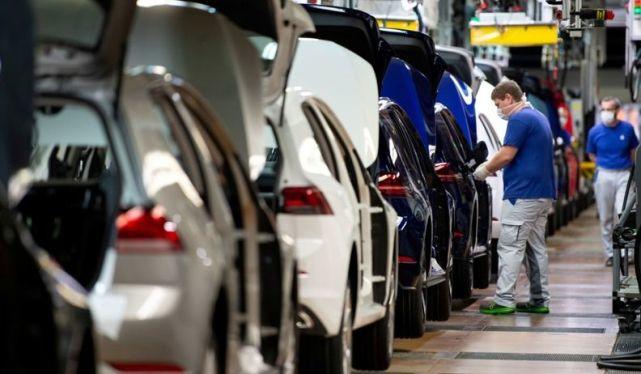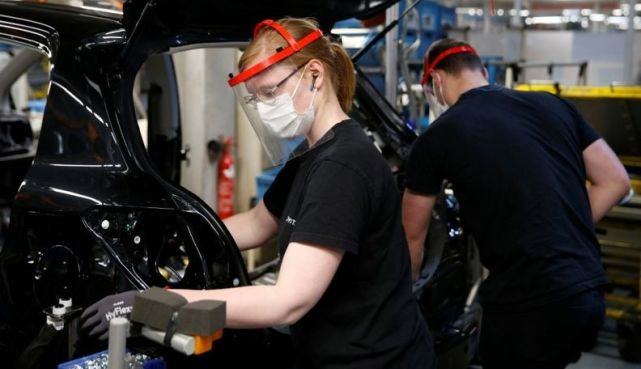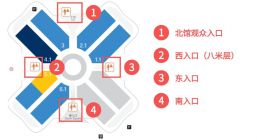
June 22, Beijing time - According to automotive News Europe, automakers and analysts said that although the European auto industry has hit the restart button, few companies have been able to return to pre-epidemic capacity, and few factories have not yet been able to operate at near full capacity, which is a worrying prospect for the industry.
A combination of safety measures to stem the spread of the disease, lower expected demand and a reduction in existing stocks that swelled during dealer closures has hampered the rapid rise in capacity. Affected by the novel Coronavirus outbreak, the European automobile factory has been suspended for several weeks or even months.
Vw said all its Factories in Europe were operating again but could only maintain capacity at 60-90 per cent of pre-outbreak levels. Renault, Europe's other biggest carmaker, also said it had resumed production at all of its plants, including Morocco and Romania, but had cut production shifts from three to two or even one to keep pace with demand.
Only Volvo has said production at its plant in Ghent, Belgium, has returned to pre-outbreak levels.
Peter Kelly, managing director of LMC Automotive, the market forecasting group, says it is reasonable to assume that about 90 per cent of Car plants in Europe are up and running, but with an average capacity of only 50 per cent. Speaking to Automotive News Europe, Kelly further pointed out that this situation will continue to change.
Carmakers will struggle to return to capacity because of fears of an outbreak, but they can change shift patterns and use some measures to get back to normal.
When Renault negotiated a return to work agreement with the unions, for example, it increased flexibility by adding shifts or taking advantage of the usual holidays; Psa Peugeot Citroen's plant in Sochaux, in eastern France, will be open for part of the summer on Saturday. Global car utilisation will be well below 50% this year, according to LMC forecasts.
Carmakers are seeing capacity restored in Europe
As of mid-June, automakers reported varying levels of detail about the pace of production. These include:

JLR: Production has resumed at all of the company's plants except Castle Bromwich in the UK starting from one shift. Castle Bromwich, which produces Jaguar's F-type, XE and XF models, is likely to reopen in August.
Nissan: The company's Plant in Sunderland, England, has reopened, but has so far resumed only one shift on one production line for the Juke and Schoo SUVs. A second line is expected to open next week, with a second shift likely by the end of the month.
Renault: All the plants, including Morocco and Romania, have been reopened but are open for one to three shifts depending on demand.
Volvo: The Ghent plant resumed three-shift operation at full capacity, with a daily output of about 1,000 vehicles. The TIts plant in Toslanda, Sweden, is still ramping up capacity to produce 1,250 cars a day.
Vw: All European factories have recovered to between 60% and 90% of their pre-outbreak capacity. Seat's plant in Matore, Spain, which also makes the Audi A1, is producing Ibiza and Arona on two shifts and will return to normal at the end of June.
Bentley: The luxury carmaker's plant in Crue, UK, is operating at 50 per cent capacity to comply with the 2-metre social distance requirement, says CHIEF Executive Adrian Halmack.
Fiat-chrysler: The Italian Bomigliano plant for the Fiat Panda and the Polandi Black plant for the Fiat 500 and Lancia Ypsilon have resumed their pre-epidemic two-shift production.
But the company's Plant in Serbia will be closed until June 29, and production at Its Jeep plant in Italy will be suspended until June 30. Alfa Romeo's plant in Cassino, Italy, briefly resumed operations and was again closed until June 30.
Hyundai Kia: Hyundai's plant in Nosovic, Czech Republic, is running on two shifts instead of three. Kia's plant in Zillina, Slovakia, will operate on two shifts until the end of July.
Daimler: Mercedes-Benz said that all its assembly and powertrain plants had "gradually resumed" production from the beginning of this month and were increasing production "flexibly" "in response to current developments and specific national regulations".
With about 44 per cent of the workforce affected, the outlook for the industry is worrying
Although the direct impact on employment varies from company to company, overall about 44 per cent of Europe's 2.6m car workers are affected, with more than 550,000 in Germany alone, according to THE Association.
Earlier in June, the association forecast that European car production, including passenger cars, buses and trucks, would fall by at least 2.5 million vehicles this year. Germany, Europe's biggest producer, will cut production by at least 615,000 vehicles and Spain by more than 450,000.
In Europe, factories are shut for an average of 30 days, including 41 days in Italy and Britain, the worst-hit countries, but only 15 days in Sweden, which is not subject to the same restrictions as other European countries.
 English
English Chinese
Chinese









